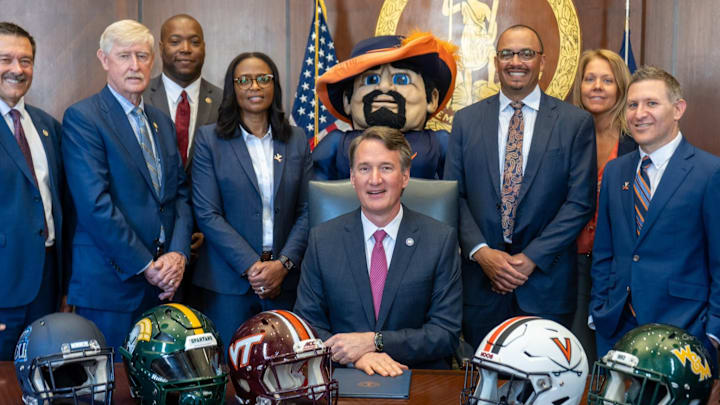New Virginia Law Allows UVA & Other VA Schools to Compensate Athletes for NIL

A new law in the state of Virginia could have massive ramifications for the way the University of Virginia and other colleges in the Commonwealth navigate Name, Image, and Likeness (NIL) in collegiate athletics. Virginia Governor Glenn Youngkin signed House Bill 1505 into law on Thursday, while joined by representatives from the University of Virginia, Virginia Tech, and other Virginia colleges.
The legislation will allow state colleges and universities to compensate their own student-athletes through NIL deals without restriction from the NCAA. The law will take effect on July 1st, 2024 and will be the first in any state in the U.S. to prohibit the NCAA from punishing a school for offering direct compensation to its athletes through NIL means. The law states that student-athletes are not considered employees of the school and the schools are still prohibited from paying athletes directly for their performance, but schools can allocate university, athletic department, or other school funds towards athletes for the purposes of marketing campaigns.
UVA athletics director Carla Williams, who played a key role in the formulation and passing of this new bill and who was present at the signing on Thursday along with UVA head football coach Tony Elliott and volleyball coach Shannon Wells, said that strictly paying athletes for marketing appearances was "maybe a distinction without a difference, but there's a distinction there." Williams also indicated that the ultimate goal is still to have a federally mandated policy that brings about consistent NIL regulations across the country.
"If this law gets us closer to a federal or a national solution for college athletics then it will be more than worthwhile. Until then, we have an obligation to ensure we maintain an elite athletics program at UVA," Williams said.
Schools in Virginia will be the first in the country to be able to legally sign NIL deals with their own players, though the governing bodies of each of those schools have to approve the policies for such procedures. Since UVA administrators played such a direct role in the passing of this bill, it should be expected that the University's Board of Visitors will be on board with this initiative as well, and that by July 1st, UVA will be able to roll out NIL-based strategies that will make the Cavaliers much more competitive in the NIL landscape.
Williams says there is still much to be determined about how the new bill will change how UVA operates in the realm of NIL, including its relationship with Cav Futures, UVA's NIL collective.
“The law provides much-needed and practical flexibility,” Williams said in an interview with UVA's Jeff White, “but we haven’t made any decisions about which provisions within the law we’ll actually activate. We’ll continue to support Cav Futures, we’ll continue to discuss our options internally, we’ll monitor the environment, we’ll talk with our coaches, our student-athletes, and we’ll make a decision that’s best for UVA.”

Matt launched Virginia Cavaliers On SI in August of 2021 and has since served as the site's publisher and managing editor, covering all 23 NCAA Division I sports teams at the University of Virginia. He is from Downingtown, Pennsylvania and graduated from UVA in May of 2021.
Follow mattynewtss